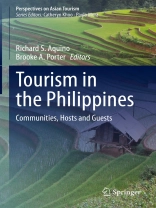This edited volume serves as the second instalment of a two-part title that aims to provide an academic exploration of the contemporary issues and perspectives on tourism in the Philippines. With a strong geographical focus, and drawn from a range of inter/multidisciplinary approaches, this book aims to provide a timely and critical investigation of issues surrounding Philippine host communities, Filipino travellers, and foreign tourists to the country. This book will serve as a platform to engage with mostly Filipino scholars allowing them to present their voices and perspectives on a range of local tourism issues, in support of cultivating a ‘culture of research’ in the Philippine academia.
This book is one of the first country-focused volumes under the series, Perspectives on Asian Tourism. This book is composed of contributions drawn from the works of Filipino academics based in the Philippines and overseas institutions researching tourism issuesin the Philippines. This book’s contributions are drawn from a diverse set of disciplines including, but not limited to sociology, anthropology, mass communications, feminist and gender studies, cultural studies, history, and tourism and hospitality studies.
Comprising chapters based on conceptual and empirical research, this edited book is divided into four parts: first, an introduction to tourism and the Filipino culture and society; second, case studies on the dynamics and impacts of tourism in local communities; third, an investigation of tourists’ gaze and experiences of Philippine destinations; and fourth, Filipino researchers’ reflexive gaze upon events, festivals, and culinary heritage in a tourism context. This book provides a collection of previously unexplored facets of Philippine tourism, Filipina tourists, and host communities, and could become an essential reading for undergraduate and postgraduate students, researchers, educators and policy-makers in tourism.
Spis treści
Part I. Introduction.- Chapter 1. Tourism and the Filipino Culture and Society.- Part II. Tourism in Philippine Communities.- Chapter 2. Performance Assessment of Barangay Nagacadan as a Community-Based Tourist Destination.- Chapter 3. Stoked in the Sea: Understanding Stakeholder Perceptions of Surfing.- Chapter 4. Strolling Between Shanties: The Case of Smokey Tours’ Slum Tourism.- Chapter 5. Re-Creating Slum Tourism in Tondo, Manila: Perspectives of the Local Residents.- Chapter 6. Residents’ Perceptions of Tourism in a Pilgrimage Destination in the Philippines.- Part III. Travellers and Tourists’ Perspectives.- Chapter 7. The Travelling Filipina in Periodicals (1898-1938).- Chapter 8. The Solo Filipina Traveller.- Chapter 9. Once Upon a Time in History: Tourist Perceptions of Dark Tourism in the Philippines.- Chapter 10. The KULAS Travelogues: A Deconstruction of Foreign Vloggers Depiction of Mindanao as a Travel Destination.- Chapter 11. “It’s More than Fun in the Philippines!” A Grounded Theory Exploration of Tourist Eudaimonic Experience in the Philippines.- Part IV. Events and Festivals: Centring Filipino Culture and Spirituality.- Chapter 12. Postcolonial Appeal of Philippine Festivals.- Chapter 13. Reclaiming Culture: Innovating Traditional Religious Performance for Tourism in the Philippines.- Part V. Conclusion.- Chapter 14. Looking Forward: Tourism Growth in a Filipino Context.
O autorze
Dr. Richard S. Aquino is a Lecturer of Tourism and Marketing at the UC Business School, University of Canterbury in Christchurch, New Zealand. He holds a Doctor of Philosophy from the Auckland University of Technology in New Zealand, where he also obtained his master’s degree in international tourism management, and a Bachelor of Science in Tourism from the University of Santo Tomas in Manila, Philippines. His doctoral research focused on how the adoption of social entrepreneurship through tourism changes host communities in the Philippines. His other research interests include sustainable tourism planning and development, geotourism, tourist behaviour, and recently, the decolonization of tourism knowledge production. Currently, he serves as the research notes editor of Tourism in Marine Environments and an editor of the Austrian Journal of South-East Asian Studies. Apart from academic work, he has been actively involved in tourism planning consultancy projects in the Philippinesand New Zealand.
Dr. Brooke A. Porter works in knowledge management as an instructional designer with international aid agencies. Brooke holds a Doctor of Philosophy from the Auckland University of Technology in New Zealand, a master’s in education from Chaminade University in Honolulu, Hawai’i, and a bachelor of science in marine biology from the Florida Institute of Technology in Melbourne, Florida. Some of her current work investigates tourism as a development and conservation strategy as well as the role of gender. Her doctoral research explored marine tourism as a supplemental livelihood for fisheries-based communities in the Philippines. Brooke also serves as an Honorary Research Fellow at Auckland University of Technology in New Zealand, and as scientific adviser to The Coral Triangle Conservancy, an NGO in the Philippines.












